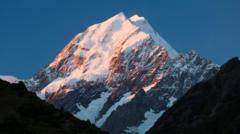In a heartbreaking development, New Zealand police have announced their belief that three climbers reported missing on Aoraki Mt Cook, the nation's highest mountain, are likely dead. The climbers, two Americans, Kurt Blair (56) and Carlos Romero (50), alongside a nameless Canadian, went missing earlier this week when they did not arrive for their scheduled flight from the mountain on Monday.
Inspector Vicki Walker, Aoraki Area Commander, stated on Friday that the climbers are presumed to have fallen during a challenging crossing of a ridge. Adverse weather conditions have significantly hindered search efforts. Walker confirmed that operations would begin winding down as authorities reassess their approach. Helicopters and drones were employed to survey the region in hopes of locating the climbers, who had commenced their ascent of Mt Cook the previous Saturday.
Drone imagery revealed signs of the climbers’ attempts to navigate the treacherous slopes beneath the Zurbriggen Ridge, showing footprints and personal items believed to belong to them, including clothing and energy gels. The climb via this ridge is classified by Climb NZ as a Grade Four, indicating that it demands advanced mountaineering skills and sound judgement. Both Blair and Romero were reported to have substantial climbing experience.
The Silverton Avalanche School in Colorado paid tribute to Kurt Blair, praising him as a "beloved fixture of the San Juan mountains, part of a lineage of mountain adventurers." A colleague recounted that he had climbed in various regions around the globe and highlighted his calm nature amidst the challenges of mountain guiding.
Conversely, Carlos Romero, affectionately known as Kique, was remembered by the California-based SWS Mountain Guides as a "cherished guide, educator, and mentor," well-regarded for his guiding expertise and passion for climbing. Originally from Venezuela, he had a professional background at the Lawrence Livermore National Laboratory in California.
New Zealand police have opted not to disclose the Canadian national's name, respecting specific wishes from his family. Aoraki Mt Cook, standing at 3,724 meters (12,217 feet), is renowned for being an enticing yet hazardous challenge, attracting climbers worldwide.
Inspector Vicki Walker, Aoraki Area Commander, stated on Friday that the climbers are presumed to have fallen during a challenging crossing of a ridge. Adverse weather conditions have significantly hindered search efforts. Walker confirmed that operations would begin winding down as authorities reassess their approach. Helicopters and drones were employed to survey the region in hopes of locating the climbers, who had commenced their ascent of Mt Cook the previous Saturday.
Drone imagery revealed signs of the climbers’ attempts to navigate the treacherous slopes beneath the Zurbriggen Ridge, showing footprints and personal items believed to belong to them, including clothing and energy gels. The climb via this ridge is classified by Climb NZ as a Grade Four, indicating that it demands advanced mountaineering skills and sound judgement. Both Blair and Romero were reported to have substantial climbing experience.
The Silverton Avalanche School in Colorado paid tribute to Kurt Blair, praising him as a "beloved fixture of the San Juan mountains, part of a lineage of mountain adventurers." A colleague recounted that he had climbed in various regions around the globe and highlighted his calm nature amidst the challenges of mountain guiding.
Conversely, Carlos Romero, affectionately known as Kique, was remembered by the California-based SWS Mountain Guides as a "cherished guide, educator, and mentor," well-regarded for his guiding expertise and passion for climbing. Originally from Venezuela, he had a professional background at the Lawrence Livermore National Laboratory in California.
New Zealand police have opted not to disclose the Canadian national's name, respecting specific wishes from his family. Aoraki Mt Cook, standing at 3,724 meters (12,217 feet), is renowned for being an enticing yet hazardous challenge, attracting climbers worldwide.





















